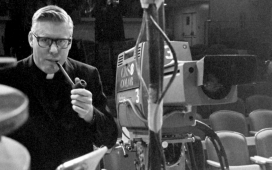Last Tuesday, at the funeral for the Supreme Court Justice John Paul Stevens, Ruth Bader Ginsburg delivered a eulogy. She concluded, “Justice Stevens much appreciated the writings of the literary genius known by the name William Shakespeare, so I will end with a line from the Bard fitting the prince of a man Justice Stevens was: ‘Take him for all in all, we shall not look upon his like again.’ ” Ginsburg’s wording was careful—it had to be, lest she mischaracterize her colleague’s views. Stevens didn’t appreciate the writings of Shakespeare; he appreciated the writings of the individual known as Shakespeare. Ginsburg’s “Hamlet” quote? Stevens, known for his dissenting opinions (Bush v. Gore, Citizens United v. F.E.C.), believed that it was probably written not by Shakespeare, the commoner from Stratford-upon-Avon, but by Edward de Vere, the seventeenth Earl of Oxford.
A quick recap of the Oxfordian theory, which was proposed in 1920, by a schoolteacher named J. Thomas Looney: Shakespeare was the front man for de Vere, an aristocrat who could not publish under his own name. (Writers were looked down on—sometimes they were even tortured or killed.) This explains why there were no books in Shakespeare’s Stratford house and why no letters written by Shakespeare survive. (Some Oxfordians think that Shakespeare was illiterate.) This explains why there is no evidence that Stratford citizens recognized Shakespeare as a writer during his lifetime. And it explains why the plays are so good, so complicated, so familiar with the concerns of nobility and the geography of Italy. (Shakespeare isn’t known to have ever left England.)
Stevens began expressing his doubts about the Bard of Avon in November of 1987, at a moot-court hearing on the topic “Who Wrote Shakespeare?” Stevens and Justices William Brennan and Harry Blackmun listened to arguments in support of the Stratford man and arguments in support of de Vere. Stevens said, of the Stratford argument, “I have lingering concerns about some of the gaps in the evidence: the absence of eulogies at the time in 1616 when Shakespeare died.” He added, “You can’t help but have these gnawing doubts that this author may, perhaps, have been someone else.” A few years later, in a law-review article, he doubled down, citing the theory that “Shakespeare is a pseudonym for an exceptionally well-educated person of noble birth who was close to the English throne.” Edward de Vere.
“The article was him coming out as an Oxfordian,” Tom Regnier, a former president of the Shakespeare Oxford Fellowship, said. The organization, which has about four hundred members—including the Shakespearean actors Derek Jacobi and Mark Rylance, who are honorary trustees—is dedicated to researching the authorship question and evangelizing about de Vere. In 2009, the group gave Stevens its highest honor: naming him Oxfordian of the Year.
Alex McNeil, the Oxfordian who was tasked with notifying Stevens, didn’t know how to contact a Supreme Court Justice, so he mailed a letter to the Court. Several weeks later, he received a response from Stevens’s secretary: “Be here on November 12th at 2PM.” (“They don’t ask, ‘Is such-and-such date good for you?’ ” McNeil said.) Regnier, McNeil, and two other Oxfordians—all attorneys—arrived at Stevens’s chambers to present him with a plaque. They chatted about the authorship question. Michael Pisapia, one of the Oxfordians who joined, said that Stevens made it clear that he was an anti-Stratfordian, but that he shied away from endorsing a definitive theory of authorship.
“He said, ‘Of course it’s not the guy from Stratford,’ ” Pisapia recalled. “But when we asked about the other candidates he’d say things like ‘Oh, I don’t bite.’ ‘What about Bacon?’ ‘No, I don’t bite.’ ‘O.K., so what about Oxford?’ He said, ‘Well, you certainly couldn’t convict anyone else of it.’ ”
But the award was not rebuffed. “He accepted it with both hands, literally,” Pisapia said. The Oxfordians understood Stevens’s reluctance to commit. “Let’s say some piece of evidence comes out and proves that it was Queen Elizabeth I,” Pisapia said. “His whole career as a jurist would have a shadow over it. Like, ‘Wow, he sure missed that one.’ ” (Although the reputation of Hugh Trevor-Roper, the historian, never quite recovered after he authenticated the Hitler diaries, Whoopi Goldberg’s career didn’t suffer when she raised doubts about the moon landing on “The View.”)
The late Justice Antonin Scalia was openly Oxfordian. Scalia told the Wall Street Journal, in 2009, that his wife “thinks we Oxfordians . . . can’t believe that a commoner could have done something like this, you know, it’s an aristocratic tendency.” (Scalia was never named Oxfordian of the Year.)
McNeil said, “We’re often accused of snobbery by the other side, but we’re not saying that someone from a small town, a four-day trip away from London, couldn’t have done this. It’s that he couldn’t have done this without leaving any evidence behind. And, for lawyers, it’s the evidentiary question that sticks out the most.”
The Oxfordians are busy planning their annual conference, which will be held this fall at the Mark Twain House, in Hartford, Connecticut. (Twain was skeptical of the Stratford man, and his last book, “Is Shakespeare Dead?,” addresses the authorship question.) “We’ll do something to honor Stevens,” Regnier said.
Pisapia credits Stevens, as well as the 2011 film “Anonymous,” with bringing the Oxfordian theory into the mainstream. “Thirty years ago, if you talked about the authorship question, you were lumped in with the flat-earthers, with the people who were going to stake out Area 51,” he said. “The Stevens thing wasn’t so groundbreaking to the rest of the world—it wasn’t like Beyoncé having twins—but it made it more acceptable to talk about.” ♦








